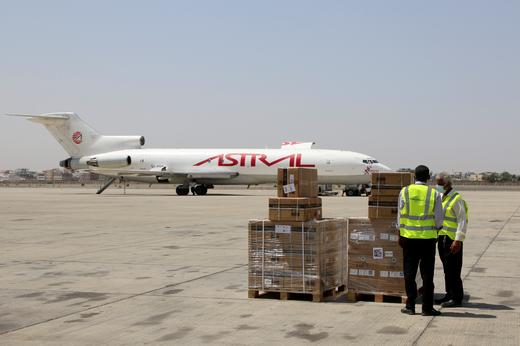Yemen received a shipment of COVID-19 vaccines this week, after the country’s internationally recognized government declared a national health emergency.
Though the actual figures are believed to be much higher, Yemen’s emergency coronavirus committee has recorded more than 4,100 coronavirus infections and 864 deaths so far. The country has struggled through war, economic collapse and a recent shortage of humanitarian aid funding, exacerbating health conditions.
Reuters reported Yemen received a shipment of 360,000 doses of AstraZeneca’s vaccine by plane at Aden International Airport on Wednesday, part of a consignment from the global COVAX vaccine-sharing scheme expected to total 1.9 million doses this year.
In Aden, the government’s interim capital in the 6-year-old proxy war between Saudi Arabia and Iran, patients at an isolation center in the grounds of a hospital lay on temporary beds in tents next to oxygen cylinders, breathing heavily.
“While some countries have successfully vaccinated half of their population, Yemen finds itself at the back of the queue,” said the head of an aid group in Yemen.
Yemen has seen a rise in cases in various parts of the country, and aid groups have noted the lack of infrastructure to tackle the growing crisis.
The war has restricted COVID-19 testing and reporting. The Houthi movement that is battling a pro-government coalition, and controls most large urban centers, has provided no figures since last May, but numbers of confirmed cases have risen rapidly since mid-February.
“We need more staff, because the rise in cases is not normal,” said Zainab al-Qaisi, a doctor and director of the isolation center. “We are exhausted from work, exhausted. The center is overwhelmed. We need oxygen, to expand intensive care across all provinces.”
Shipments of COVID-19 vaccines will help the country protect some of its most vulnerable populations.
COVAX is co-led by the GAVI alliance, which secures vaccines for poor countries, the World Health Organization (WHO), the Coalition for Epidemic Preparedness Innovations and the U.N. Children’s Fund, UNICEF.
“Yemen now has the capacity to protect those most at risk, including health workers, so that they can safely continue to provide life-saving interventions for children and families,” said Philippe Duamelle, UNICEF’s representative in Yemen.
— Wire and staff






Leave a Reply